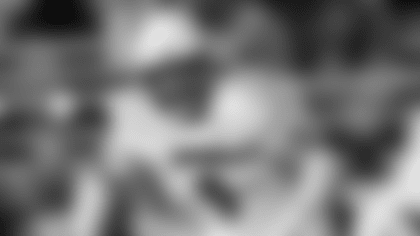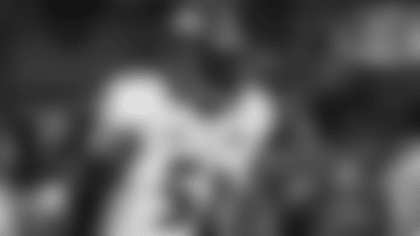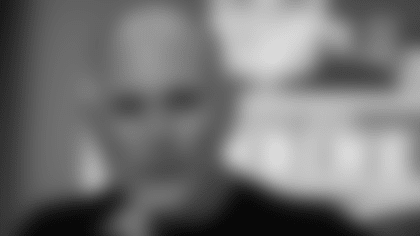In the summer of 1971, 11-year-old Cam Cameron set off for a two-week trip with a man he had never met.
It was just him and the man in the car traveling from Durham, N.C. to Annapolis, Md. It was Cameron's first venture outside of North Carolina.
To Cameron, this was a guy his mom had been dating for only a couple months. What he didn't know was that they were getting serious and this was the big meet-the-kids moment.
The man was asking him all sorts of questions, yet Cameron didn't feel the slightest tinge of nervousness. Actually, he recalls it feeling like riding with Santa Claus.
The man was Tom Harp, the newly-hired running backs coach at the Naval Academy in Annapolis, and former head football coach at Duke and Cornell.
Neither knew this yet, but Harp was also Cameron's future stepfather – the man that would ultimately send him down the path of coaching.
"That was the perfect time for me to have a man – much less a football coach – come into my life," Cameron said. "My life could have turned out completely different. My stepfather changed everything."
Cameron's biological father had left the picture a few years earlier via divorce. His mom was working long hours trying to support her son and his older sister.
But what lay ahead was a who's who of coaching and playing brilliance that would mold Cameron into one of the most highly-regarded offensive minds in the game and the Baltimore Ravens' offensive coordinator.
The most important was Harp, but the list includes Larry Bird, Lee Corso, Sam Wyche, Bobby Knight, Bo Schembechler and Marty Schottenheimer, just to name a few.
"He's learned from everybody," Harp said. "He's learned from some of the best in the business."
'Life Was Good'

Harp was leading Cameron into a field house on the Naval Academy campus when they came upon a quarterback throwing into a net.
The quarterback would drop back, set his feet and wait to watch for a light to flash overtop one of three targets. Cameron, who was already a standout young signal caller, was moonstruck.
"Guess who that guy was?" Cameron says, still with a grin. "Roger Staubach. From that point forward, I wanted to be Roger Staubach."
Staubach, the future Dallas Cowboys legend and Pro Football Hall of Famer, autographed a picture for Cameron. At the end of the trip, Harp bought Cameron his first pair of football cleats, as well as his first milkshake.
"Life was good," Cameron said.
Two years later, Harp landed the head coaching job at Indiana State and Cameron's mom, Barbara, and her two kids joined him in Terre Haute, Ind.
Cameron would ride with Harp to the Indiana State coaching offices every day during the summer. He practically lived there from 7th grade through high school.
The coaches' offices were attached to the gymnasium, so Cameron was constantly playing ball. But anytime he wasn't, he was hanging around the coaches, watching, studying the game of football.
A coach by the name of Bobby Turner took Cameron under his wing. At 13 years old, Cameron would watch tape, read coaching how-to books, flip through the team's playbook. He began sitting in on meetings and helping run practice drills.
"He was asking questions that the players were asking me, or questions coaches would ask other coaches," said Turner, now a 19-year NFL running backs coach with the Redskins. "They were very intelligent questions."
Turner and Cameron also shared a passion for basketball. Every day at noon, they would scarf lunch in five minutes and head to the court for pick-up games against other coaches, locals and even Indiana State's basketball team.
That's where Cameron met the next celebrity – future NBA legend Larry Bird.
Bird was becoming a star at Indiana State as Cameron was entering high school. When the college team was short on players for drills, Cameron would step into scrimmages. As he got better, he would even sometimes be assigned to guard Bird.
"I learned what a competitor really is," Cameron said. "Larry competed as hard in the summer as he did competing for the NBA championship. There's no difference."
At the same time, Cameron was becoming a star player himself, on the court and the field.
'He Would Ask Why, Why, Why'
When Cameron's high school football coach, the late Bob Clements, told his assistants that he was going to start letting Cameron call his own plays as a sophomore quarterback, they were naturally a bit taken aback.
"I think Bobby's exact words were, 'I've got to let him call the plays because if I don't I'm going to screw him up,'" recalls Mark Miller, Cameron's junior high coach.
As a quarterback, Cameron was a two-time All-State selection and All-American as a senior. As a point guard, he led South Vigo High's basketball team to three consecutive state finals.
But there was still a coach at home, who wasn't afraid to challenge Cameron on a daily basis.
Harp and Cameron frequently squared off in football "debates." They often started at the dinner table, and it didn't take long before they were up out of their seats, arranging chairs as stand-ins as they acted out their plays, countering each other's every move.
It would often end up in shouting, Cameron says, with his mother getting upset and leaving. The head football coach and high-school teenager usually weren't angry. They were just engrossed in a battle of football wits.
"We would stand our ground," Cameron said. "There were sometimes, I have to admit, he'd get the best of me. He'd get the best of me eight times out of 10 – and he loved it."
"He'd want to know why, why, why, until he finally would get satisfied," Harp said.
"I knew from the way that he reacted, the questions he asked and the arguments he made, that he was going to become very knowledgeable about the game. You don't argue about something unless you're interested enough to learn more about it."
'Masters and Doctorate in Football'
Cameron decided to play at Indiana, which then employed some of the most-respected coaches of its time.
For his first three years he was coached by Lee Corso, who is now mostly seen as a funny-man ESPN college football analyst, but was an excellent coach for a decade at Indiana.
Sam Wyche came in for Cameron's senior year, fresh off winning a Super Bowl with the San Francisco 49ers. Wyche, who later became known as the guru of the no-huddle offense, taught Cameron the West Coast offense.
"He opened my mind to creativity," Cameron said.
Cameron also played basketball at Indiana, which meant he was mentored by legendary coach Bobby Knight. Knight is known for his fiery temper, but Cameron most remembers his integrity, his hardline stance against cheating.
Cameron also learned that you don't have to have the best team to win. In his senior year, Cameron played against Michael Jordan and the Tar Heels. Thanks to Knight's film study and game plan, Indiana held Jordan to 12 points and won.
"Give your players every opportunity to be successful," Cameron recalls learning. "Look at every little detail, every little thing, to give guys the most information."
Cameron had a chance at landing on an NFL training camp roster, but blew his knee out and immediately turned his attention toward coaching.
On a recommendation from Knight, Cameron got a job as a graduate assistant at Michigan under Bo Schembechler, who amassed a 191-48-5 record in 21 seasons in Ann Arbor. Over the next two years, Cameron got "his masters and doctorate in football."
"Bo Schembechler taught me what it means to lead people," Cameron said. "He didn't manage people, he led them. And there's a huge difference."
In 1985, Cameron was named Michigan's quarterbacks and wide receivers coach. The first quarterback he ever coached was Jim Harbaugh, current San Francisco 49ers head coach and brother of Ravens Head Coach John Harbaugh.
It was time for Cam to put his teaching into practice.
'Neither of Us Had A Stop Button'
Cameron was only three years older than Jim Harbaugh when the two started working together. They immediately hit it off.
Harbaugh describes that time as experimental, trying anything and everything in the name of improvement.
Cameron devised countless drills and new techniques. He would lengthen Harbaugh's drop, then shorten it. Throw 10 out-passes one way, then try a different way and throw 10 more. He'd drag a net over to throw in, then a lacrosse goal.
Harbaugh remembers being woken up in the middle of the night to practice more throws.
"Neither of us had a stop button," Harbaugh said. "He just has a love of the game and it was stimulating talking football with him. It was obvious he was going to be a great coach."
In their first year together, Harbaugh became the NCAA's most efficient quarterback. Michigan won the Fiesta Bowl that season and reached the Rose Bowl the next. Harbaugh became a first-round draft pick and eventually played 15 years in the NFL.
"Even though he was so young, he was as good as any coach I ever had in my whole playing career," Harbaugh unequivocally said.
Cameron's career took off as well. Soon, he was coaching future NFL quarterbacks Elvis Grbac and Todd Collins. The NFL came calling in 1994, and Cameron helped steer Gus Frerotte and Trent Green each to Pro Bowls with the Washington Redskins.
After a stint as head coach at his alma mater of Indiana, Cameron headed west to San Diego to coach under the well-respected offensive mind of Marty Schottenheimer. There, Cameron groomed Drew Brees and Philip Rivers, two of today's top quarterbacks.
"He's one of the best coaches in America," said Scot Loeffler, another of Cameron's quarterbacks at Michigan who is now the offensive coordinator at Temple.
"If my son ever grows into a quarterback, I'd want Cam to coach him."
'The Typical Great Dad'
There's more to Cameron than coaching, and it's what those who have known him always begin and end a conversation with.
He's a good man, a religious man, a family man.
Cameron's the father of four, constantly on the run taking them somewhere. His eldest son, Tommy, is a forensics debater. Danny is a sports nut. Christopher loves nature and is in the Boy Scouts. His daughter, Elizabeth, the youngest of the kids, likes horses and music.
"I just think he's the typical great dad," John Harbaugh said. "We've had a lot of conversations about kids and the Christian faith."
At the allowance of Harbaugh, Ravens coaches and players are free to bring their kids to work. Cameron takes full advantage. Last year, his sons were constantly at training camp and were often seen in the middle of locker room huddles. Danny has been on the sidelines for more than 100 NFL games.
"It means the world to me and I'm sure it means a lot to them," Cameron said.
Cameron hasn't lost touch with his stepdad, the man who started it all with that two-week trip back in 1971.
It's rare that Cameron goes a day without speaking with Harp. They talk before every Ravens game and again not long after. They still debate, including after the Ravens' gut-wrenching regular-season loss to the Steelers last year.
"It's nice to have someone in your life that you know loves you and will be brutally honest," Cameron said. "I can't imagine anyone having as many people in their life, influencing them with such integrity and general concern for their well-being, than me."


















